Sci e snowboard sono sport invernali entusiasmanti che attraggono appassionati da tutto il mondo. Quando si intraprendono queste avventure, è fondamentale dotarsi dell'attrezzatura giusta per garantire la sicurezza e migliorare le prestazioni. Tra le scelte cruciali in termini di attrezzatura, spesso si pone la questione tra occhiali da sole e maschera. In questo articolo, esploreremo i vantaggi e gli svantaggi di entrambe le opzioni e vi guideremo verso una decisione consapevole e adatta alle vostre esigenze.
Si può sciare con gli occhiali da sole?

Gli occhiali da sole sono da tempo associati alle spiagge assolate e alle passeggiate tranquille. Tuttavia, hanno trovato posto anche sulle piste da sci e snowboard. La loro funzionalità e il loro stile li rendono una scelta ideale per molti amanti degli sport invernali.
Con loro montature leggere e lenti colorate, gli occhiali da sole offrono un'eccellente protezione contro i riflessi del sole e i dannosi raggi UV. Gli occhiali da sole per lo sci proteggono gli occhi da elementi come particelle di polvere, vento e neve, creando un campo visivo nitido. Inoltre, gli occhiali da sole sono disponibili in una varietà di design, consentendo agli atleti di personalizzare il proprio look senza rinunciare alla funzionalità.
Occhiali da sci vs. occhiali da sole
Quando si decide tra occhiali da sci e occhiali da sole per gli sport invernali, ci sono delle differenze fondamentali da considerare.
Le maschere da sci offrono una copertura superiore, proteggendo occhi, guance e fronte da temperature gelide e vento. Gli occhiali da sole offrono una copertura limitata, proteggendo solo gli occhi. Le maschere offrono una migliore funzionalità, una vestibilità sicura e una visione periferica più ampia.
Hanno anche funzioni antiappannamento per una visione nitida in diverse condizioni. Entrambe le opzioni offrono protezione UV, ma le maschere offrono una schermatura migliore. Quindi, scegli maschere da sci per una copertura, prestazioni e protezione ottimali sulle piste.
Gli occhiali da sole possono sostituire le maschere da sci?
Sebbene gli occhiali da sole possano essere una scelta adatta per determinate condizioni sciistiche e di snowboard, non possono sostituire completamente le maschere da sci in ambienti più estremi. Le maschere offrono un livello di protezione e funzionalità superiore, rendendole la scelta migliore per gli appassionati di sport sulla neve più esigenti.
In situazioni in cui il clima è rigido e la neve è fitta, gli occhiali da sci risultano indispensabili. Formano una sorta di sigillo intorno agli occhi, proteggendoli da neve, ghiaccio e altri detriti. L'isolamento aggiuntivo mantiene gli occhi caldi e riduce al minimo il rischio di fastidi o lesioni dovuti a condizioni meteorologiche estreme.
Inoltre, gli occhiali forniscono protezione UV superiore Rispetto alla maggior parte degli occhiali da sole, la maggiore copertura e le lenti specifiche utilizzate negli occhiali garantiscono il blocco dei dannosi raggi UV, riducendo al minimo il rischio di patologie come la cecità da neve e danni oculari a lungo termine.
Gli occhiali da sci sono necessari per i principianti?
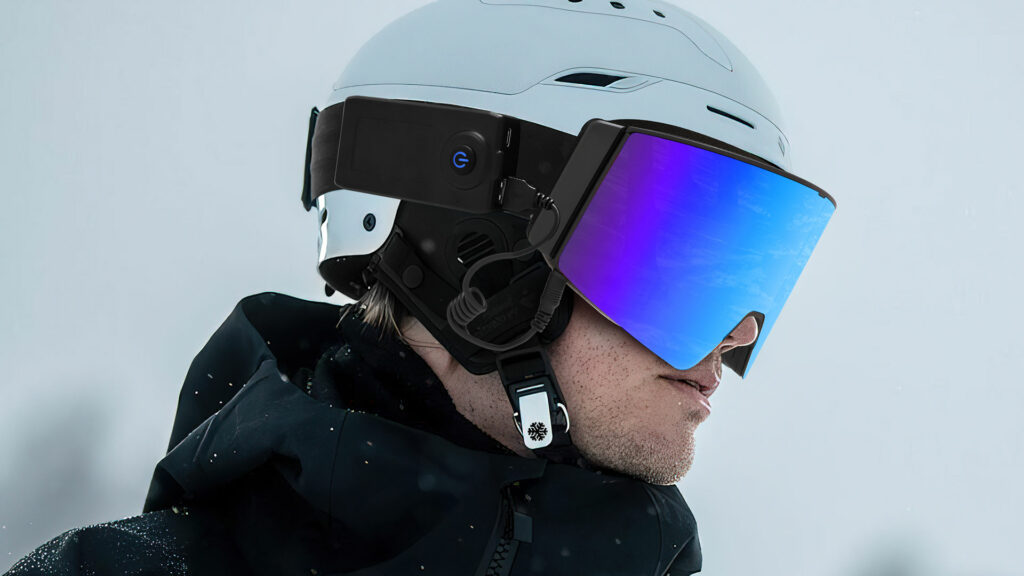
Per i principianti dello sci e dello snowboard, spesso ci si chiede se gli occhiali da sci siano necessari. Anche se potrebbe sembrare allettante optare per gli occhiali da sole, data la loro praticità e versatilità, gli occhiali protettivi sono altamente consigliati anche per i principianti.
Innanzitutto, i principianti tendono a trascorrere più tempo a terra man mano che si abituano allo sport. Questo maggiore contatto con la neve può portare al sollevamento di più particelle di neve, aumentando il rischio di irritazioni e fastidi agli occhi. Le maschere da sci offrono la protezione necessaria contro questi elementi, consentendo ai principianti di concentrarsi sulla tecnica senza distrazioni.
Inoltre, i principianti sono più soggetti a incidenti e caduteGli occhiali da sci svolgono un ruolo fondamentale nel proteggere gli occhi da potenziali lesioni, come rami, ghiaccio o persino bastoncini da sci vaganti. La loro struttura robusta e la resistenza agli urti garantiscono che gli occhi rimangano illesi in caso di incidente.
Hai bisogno di occhiali da sci per lo sci e lo snowboard?
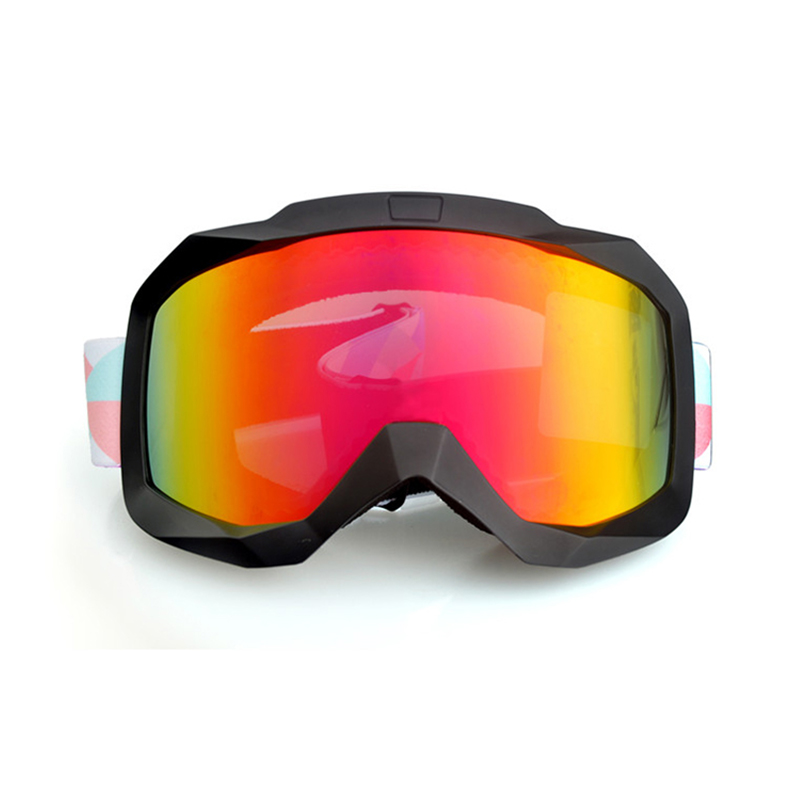
Le maschere da sci offrono una gamma di vantaggi più ampia rispetto agli occhiali da sole per chi pratica sport invernali. Progettate specificamente per gli sport invernali, offrono una protezione migliorata. protezione dagli elementi. La vestibilità aderente e la superficie più ampia delle lenti offrono una copertura superiore, proteggendo occhi, guance e fronte da temperature gelide e venti gelidi, migliorando al contempo la visione periferica. Le maschere da sci sono inoltre dotate di rivestimenti antiappannamento e sistemi di ventilazione per garantire nitidezza e sicurezza costanti.
Oltre alla protezione, gli occhiali da sci migliorano qualità della vista Con lenti specializzate che migliorano il contrasto, la percezione della profondità e la vivacità dei colori. Riducono inoltre l'affaticamento degli occhi, consentendo agli atleti di concentrarsi per periodi più lunghi senza fastidi. Indubbiamente, le maschere da sci sono un accessorio fondamentale per lo sci e lo snowboard, offrendo un design studiato appositamente e funzionalità avanzate per atleti di tutti i livelli.
È possibile indossare gli occhiali sotto la maschera da sci?
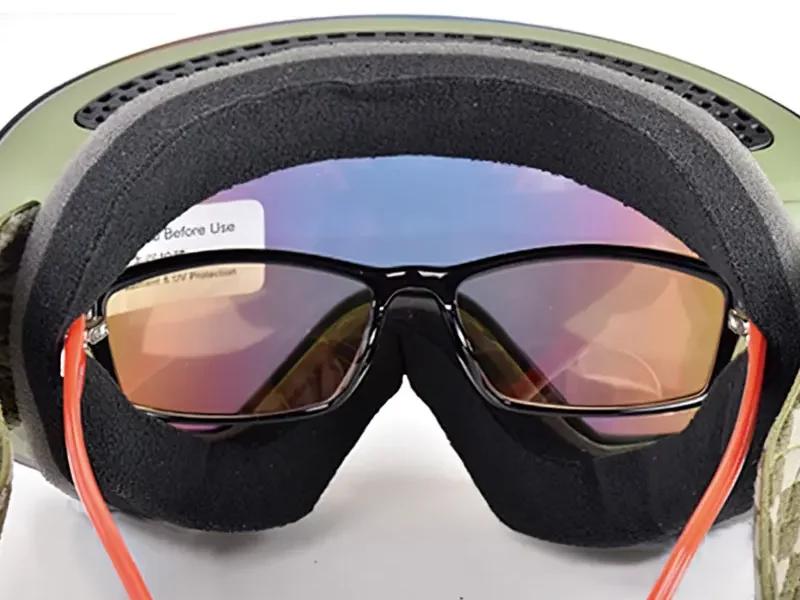
Per chi indossa occhiali da vista, la difficoltà di abbinarli agli occhiali da sci può essere un problema. Tuttavia, molti occhiali da sci sono progettati per ospitare comodamente gli occhiali, garantendo che le persone con problemi di vista possano godere appieno degli sport invernali.
Le maschere da sci con montatura appositamente progettata possono ospitare gli occhiali senza compromettere la vestibilità o la funzionalità. Queste maschere in genere hanno montature più grandi e aperture più ampie per accogliere le aste degli occhiali. Inoltre, è possibile aggiungere inserti in schiuma per creare una barriera tra gli occhiali e la pelle, migliorando il comfort e prevenendo l'appannamento.
È possibile ottenere occhiali da sci con prescrizione medica?
Sono finiti i giorni in cui le persone con problemi di vista avevano opzioni limitate per praticare gli sport invernali. Occhiali da sci con prescrizione medica hanno rivoluzionato il modo in cui le persone con gli occhiali possono divertirsi sciando e facendo snowboard.
Questi occhiali specializzati sono dotati di lenti graduate, adatte alle specifiche esigenze visive di chi li indossa. Offrendo lo stesso livello di protezione, chiarezza e funzionalità degli occhiali da sci tradizionali, gli occhiali graduate eliminano la necessità di indossare gli occhiali sotto, garantendo un'esperienza sulle piste senza problemi e confortevole.
Come scegliere la maschera migliore per lo snowboard?
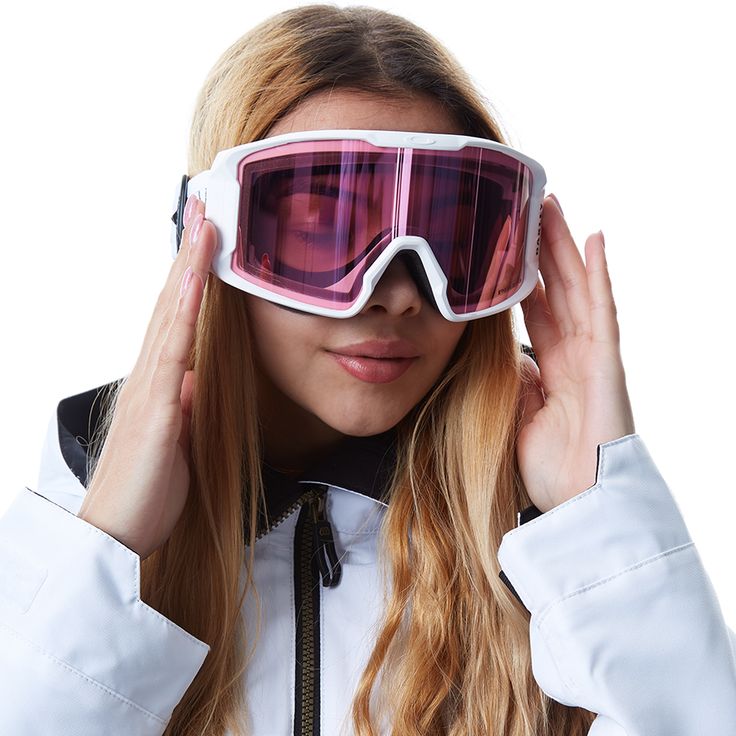
Scegliere la migliore maschera da sci per lo snowboard è fondamentale per garantire prestazioni e protezione ottimali. Ecco alcuni fattori da considerare nella scelta:
- Qualità delle lenti: Cercate maschere con lenti di alta qualità che offrano una nitidezza ottica superiore e protezione UV. Inoltre, valutate le opzioni di colorazione delle lenti in base alle condizioni di illuminazione che incontrerete sulle piste.
- Ventilazione: Una ventilazione adeguata è fondamentale per prevenire l'appannamento. Cercate occhiali con sistemi di ventilazione efficaci che consentano il passaggio dell'aria, proteggendo al contempo da neve e vento.
- Vestibilità e comfort: Gli occhiali devono aderire perfettamente al viso, ma in modo confortevole. Cerca cinturini regolabili, imbottiture in schiuma e materiali morbidi che offrano una vestibilità sicura e ammortizzata.
- Rivestimento antiappannamento: Scegli occhiali con rivestimenti o tecnologie antiappannamento per garantire una visione nitida in tutte le condizioni.
- Compatibilità: Se indossi un casco o degli occhiali, assicurati che gli occhiali siano compatibili con questi accessori, per una vestibilità perfetta.
- Durata: Cerca occhiali con montature robuste e lenti antigraffio per resistere alle sollecitazioni dello snowboard e dello sci.
Dove posso acquistare gli occhiali da sci?
Ora che hai compreso l'importanza delle maschere da sci e le loro varie caratteristiche, potresti chiederti dove acquistarle. Le maschere da sci sono ampiamente disponibili e ci sono numerose opzioni per l'acquisto sia in negozio che online.
Negozi specializzati in articoli sportivi, rivenditori di attrezzature per sport invernali e persino alcune stazioni sciistiche offrono una gamma di maschere da sci. Inoltre, i mercati online o produttori di occhiali da sci offrono una vasta scelta di opzioni, con la comodità di poter consultare e acquistare comodamente da casa propria.
Al momento dell'acquisto, ricordatevi di considerare fattori come la reputazione del marchio, le recensioni dei clienti e le condizioni di garanzia. Questo vi garantirà di ricevere un prodotto di qualità che soddisfi le vostre esigenze e duri per molte stagioni avventurose a venire.
Conclusione
Che si scelgano occhiali da sole o maschere da sci, proteggere gli occhi mentre si scia o si fa snowboard è di fondamentale importanza. Mentre gli occhiali da sole offrono stile e funzionalità, le maschere da sci assicurano una protezione senza pari e prestazioni migliori. Dalla protezione dalle intemperie alla prevenzione di infortuni e al miglioramento della vista, le maschere si affermano come la scelta preferita dagli appassionati di sport invernali più esigenti. Se indossate occhiali da vista, non preoccupatevi, perché le maschere da sci con prescrizione offrono ora una soluzione perfetta. Quindi, prima di lanciarvi sulle piste, valutate attentamente le vostre esigenze specifiche, esplorate le diverse opzioni disponibili e prendete una decisione consapevole per godervi appieno la vostra esperienza di sport invernali. Rimanete al sicuro, vedete chiaramente e conquistate le montagne in tutta sicurezza.

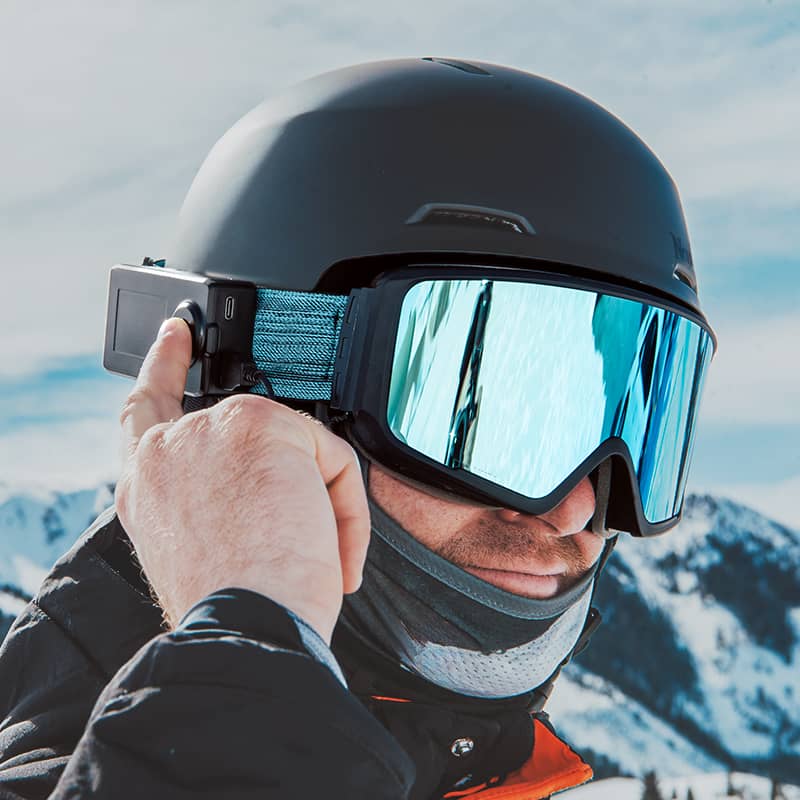
25年-香港展邀请函(横屏-英文版)-1024x358.jpg)

